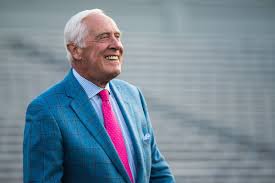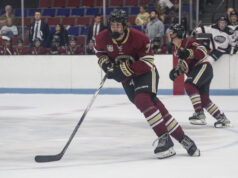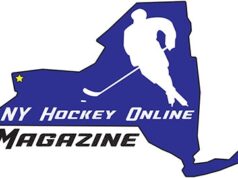BY RANDY SCHULTZ —
Pete Dawkins is one of the most accomplished cadets to ever come out of West Point. He was a Heisman Trophy winner and captain of Army’s 1958 unbeaten football team.
Dawkins is the first and only cadet to become Cadet Brigade Commander, class president, captain of the football team and a ‘star man,’ finishing in the top five percent of his class.
Upon graduation from West Point he studied for three years at Oxford as a Rhodes Scholar and later received his doctorate from Princeton. He continued his Army career and was promoted to Brigadier General and served in the Pentagon as the Army’s Deputy Director of Strategy, Plans and Policy before retiring in 1983 after 24 years of dedicated service.
But as hard as this may to believe, it was actually the sport of hockey that got him in the door of West Point.
“I loved hockey,” recalled Dawkins. “You learned to love hockey if you grew up in Michigan.
“A friend of mine, Larry Asbury, had gone to the Academy a year before I graduated from high school. We had gone to high school together at Cranbrook.
“Larry had stayed in contact with me and explained what a great time he was having at West Point. He had quite an influence on me becoming interested in West Point.
“So at the end of my junior year in high school, my football coach went with me to me to see legendary Army football coach Red Blaik. We waited and finally saw him.”
Within a few minutes, the conversation was over with and the duo went back to Michigan.
To get into West Point you have to be recommended and appointed. That comes from a Congressman or Senator.
“By the time I applied, all of the Congressmen and Senators had given out their principle appointments,” said Dawkins. “I was able to get an alternate appointment.
“It allowed me to take all of the entrance, medical and scholastic exams. Which I passed.
“What I later found out is that the athletic coaches at West Point have a claim on a number of people that they can pull in from the qualified alternate pool. I got my letter in June of my senior year explaining that I had been accepted into West Point through this category.
“Only later, once I got to West Point, that I found out that it was their hockey coach, Jack Riley, not Blaik, who had selected me out of the qualified alternate pool. I suspect to this day that it was my friend, Larry Asbury, who must have talked to Riley about me and my hockey career back in Michigan.”
Dawkins would go on to earn three letters on the hockey team during his time at West Point and was a top-scoring defenseman, serving as the assistant captain his senior year. He went on to explain about his love of hockey.
“It was the sport I really enjoyed playing the most,” continued Dawkins, now 75. “If you could hit it with a stick, throw it or chase it I played it.
“Jack Riley was a remarkable person (Riley coached the gold medal winning 1960 U.S. men’s hockey team). He was one of the greatest motivators I’ve ever been with as far as a coach goes.
“We played on Smith Rink at West Point. I think it was the largest ice rink in North America at the time.
“I think Army won every third period we played at home because the surface was so big. The opposition was so exhausted by the time they got to the third period.
“We practiced on it every day so we were used to it.”
Dawkins only had one problem to deal with as a hockey player.
“The football season and hockey season overlapped,” explained Dawkins. “The hockey team had already played three or four games before we would get to the Army-Navy football game.
“So the Army-Navy game would be on a Saturday. I would play the game, take off Sunday and be at hockey practice on Monday.
“I didn’t have a lot of transition time from one sport to another. It was just something I had to put up with.”
Interestingly one of Dawkins most memorable hockey experiences occurred following graduation from West Point.
“A friend invited me to practice with the Detroit Red Wings,” explained Dawkins. “I thought I had died and gone to heaven.
“I jumped at the chance. It was a couple of weeks before the Red Wings opened their season.
“So they allowed me to warm up with the team and then they had a scrimmage. I was put on a line with Gordie Howe.
“I played against a team that had Red Kelly on defense and Terry Sawchuk in goal. So we began playing and before you knew it I had scored a goal.
“Things got a little rougher after that because these guys are competitors. But I ended up scoring another goal. That’s when things really got rough.
“I was simply trying to keep from getting hurt out there. And wouldn’t you know it, I scored again.
“After that third goal, Sawchuk broke his stick over the crossbar and went in the locker room and wouldn’t come back out.
“My brief NHL career and hockey career was over.
“It was time for me to move on.”
And move on he did.







